- Home
- Medical news & Guidelines
- Anesthesiology
- Cardiology and CTVS
- Critical Care
- Dentistry
- Dermatology
- Diabetes and Endocrinology
- ENT
- Gastroenterology
- Medicine
- Nephrology
- Neurology
- Obstretics-Gynaecology
- Oncology
- Ophthalmology
- Orthopaedics
- Pediatrics-Neonatology
- Psychiatry
- Pulmonology
- Radiology
- Surgery
- Urology
- Laboratory Medicine
- Diet
- Nursing
- Paramedical
- Physiotherapy
- Health news
- Fact Check
- Bone Health Fact Check
- Brain Health Fact Check
- Cancer Related Fact Check
- Child Care Fact Check
- Dental and oral health fact check
- Diabetes and metabolic health fact check
- Diet and Nutrition Fact Check
- Eye and ENT Care Fact Check
- Fitness fact check
- Gut health fact check
- Heart health fact check
- Kidney health fact check
- Medical education fact check
- Men's health fact check
- Respiratory fact check
- Skin and hair care fact check
- Vaccine and Immunization fact check
- Women's health fact check
- AYUSH
- State News
- Andaman and Nicobar Islands
- Andhra Pradesh
- Arunachal Pradesh
- Assam
- Bihar
- Chandigarh
- Chattisgarh
- Dadra and Nagar Haveli
- Daman and Diu
- Delhi
- Goa
- Gujarat
- Haryana
- Himachal Pradesh
- Jammu & Kashmir
- Jharkhand
- Karnataka
- Kerala
- Ladakh
- Lakshadweep
- Madhya Pradesh
- Maharashtra
- Manipur
- Meghalaya
- Mizoram
- Nagaland
- Odisha
- Puducherry
- Punjab
- Rajasthan
- Sikkim
- Tamil Nadu
- Telangana
- Tripura
- Uttar Pradesh
- Uttrakhand
- West Bengal
- Medical Education
- Industry
Women undergoing menopausal symptoms may have poor CV health metrics

A recent study by Hye Rin Choi and team suggests that premenopausal women with menopause symptoms, whether vasomotor or nonvasomotor, are more likely to have poor cardiovascular health metrics. The findings were published in Menopause Journal.
The study included 4,611 women aged 42 to 52 years, examined the prevalence of ideal CVH metrics and their correlation with various menopause symptoms and CVH metrics data was collected during health screening examinations. Menopause symptoms were assessed using the Korean version of the Menopause-Specific Quality of Life questionnaire. The participants were divided into two groups: those with absent symptoms and those experiencing symptoms. The symptomatic group was further categorized based on the severity of vasomotor, psychosocial, physical, and sexual symptoms, ranging from 0 to 7, with 7 indicating the most bothersome symptoms. CVH metrics were evaluated according to the American Heart Association Life Simple 7 metrics, excluding the dietary component. The metrics were scored from 0 (unhealthy) to 6 (healthy) and classified as poor (0-2), intermediate (3-4), and ideal (5-6).
The results of the study revealed a significant correlation between overall menopause-specific quality of life scores and poorer CVH metrics. Furthermore, all four domains of menopause symptoms—vasomotor, psychosocial, physical, and sexual—were found to be associated with poorer CVH metrics in a dose-response manner.
After adjusting for various factors such as age, parity, education level, anti-Mullerian hormone levels, and alcohol intake, the researchers found that women experiencing the most severe degree of vasomotor, psychosocial, physical, and sexual symptoms had a significantly higher prevalence of poor CVH metrics.
The prevalence ratios (95% confidence interval) for poor CVH metrics were 2.90 (1.95-4.31), 2.07 (1.36-3.15), 3.01 (1.19-7.65), and 1.66 (1.15-2.39), respectively, compared to those without each respective symptom.
These findings emphasize the importance of addressing menopause symptoms and implementing appropriate cardiovascular health measures in premenopausal women to reduce the risk of future cardiovascular problems.
Source:
Choi, H. R., Chang, Y., Kim, Y., Cho, Y., Kwon, M.-J., Kang, J., Kwon, R., Lim, G.-Y., Kim, K.-H., Kim, H., Cho, J., Guallar, E., Park, H.-Y., & Ryu, S. (2023). Vasomotor and other menopause symptoms and the prevalence of ideal cardiovascular health metrics among premenopausal stage women. In Menopause (Vol. 30, Issue 7, pp. 750–757). Ovid Technologies (Wolters Kluwer Health). https://doi.org/10.1097/gme.0000000000002203
Neuroscience Masters graduate
Jacinthlyn Sylvia, a Neuroscience Master's graduate from Chennai has worked extensively in deciphering the neurobiology of cognition and motor control in aging. She also has spread-out exposure to Neurosurgery from her Bachelor’s. She is currently involved in active Neuro-Oncology research. She is an upcoming neuroscientist with a fiery passion for writing. Her news cover at Medical Dialogues feature recent discoveries and updates from the healthcare and biomedical research fields. She can be reached at editorial@medicaldialogues.in
Dr Kamal Kant Kohli-MBBS, DTCD- a chest specialist with more than 30 years of practice and a flair for writing clinical articles, Dr Kamal Kant Kohli joined Medical Dialogues as a Chief Editor of Medical News. Besides writing articles, as an editor, he proofreads and verifies all the medical content published on Medical Dialogues including those coming from journals, studies,medical conferences,guidelines etc. Email: drkohli@medicaldialogues.in. Contact no. 011-43720751


